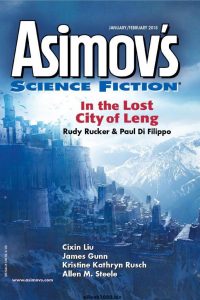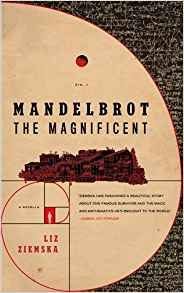Interstellar MegaChef by Lavanya Lakshminarayan: Review by Ian Mond
 Interstellar MegaChef, Lavanya Lakshminarayan (Solaris 978-1-83786-233-7, $16.99, 400pp, tp) November 2024.
Interstellar MegaChef, Lavanya Lakshminarayan (Solaris 978-1-83786-233-7, $16.99, 400pp, tp) November 2024.
I’ve always loved a good cooking show. Back in the day, it was Top Chef (where a contestant always undercooked the chicken) and Great British Menu (where every pudding had to include rhubarb). Now, I’m obsessed with Uncle Roger’s YouTube channel. His takedown of Jamie Oliver’s Egg Fried Rice, with 28 million views and over one million likes, is legendary. Competition cooking, but also the experience and cultural significance of preparing and tasting food, is central to Lavanya Lakshminarayan’s excellent new novel Interstellar MegaChef, the first in a series and the follow-up to her superb Clarke Award-nominated debut The Ten Percent Thief. More than just a foodie’s delight – I promise it will make your stomach grumble – Interstellar Megachef is an intelligent dissection of utopian societies and the insidious nature of cultural imperialism.
Let’s start with the mise en place. The novel begins with “A Brief History of the Nakshatrans” (Nakshatra is the Hindu and Buddhist term that refers to the 27 constellations that shape a person’s life). Founded in 2325, the Nakshatran Programme and its corresponding charter aim to “reinvent human culture across the Universe… of new futures amidst the stars.” The movement is a response to the dissolution of all nation-states on Earth, replaced by warring Protectorates fighting over dwindling resources. Fifty years later, the first Nakshatran-led starship lands on the planet Primus, a new home for humanity, or at least those lucky enough to escape Earth.
Skip two millennia, and we arrive at the main course. Saraswati Kaveri has fled Earth – where her family ruthlessly governs the Daxina Protectorate – for Primus, where she’s been invited to compete on the hugely popular reality show Interstellar MegaChef. It’s a provocative move on the part of the producers, given that Earthlings are viewed as violent barbarians who cook with flame and use whole foods. This is in contrast to the ultrarefined techniques of the Primians, who, in line with their belief in “treading lightly” and respecting a planet’s ecology, extract the essence of an ingredient – its ras. Saras is aware of this, but as a critically acclaimed chef back on Earth, she believes she can wow the judges with her old-fashioned methods. She couldn’t be more wrong. Running parallel to Saras’s story is that of Serenity Ko, the abrasive, high-flying, arrogant developer of the hugely popular SoundScape (a highly immersive sim). After an incident at a bar – more like a riot – she’s forced to take leave. Pissed off, Ko starts ruminating on a new idea, a sim that will completely revolutionise the experience of tasting food. It’s a bold project that will see her path intersect with that of Saras.
Interstellar MegaChef is a delight to read (you’d expect no less from a novel emblazoned with a Homer Simpson-style doughnut). Lakshminarayan avoids one of the pitfalls of far-future fiction – front-loading the narrative with exposition – by commencing each chapter with an excerpt from an article or textbook briefly describing Primian cuisine or the dos and don’ts of Nakshatran society. It also helps that Saras is a fish out of water, although one who has more than a basic grounding in Primian culture, having been saturated by their media. What Saras is not expecting, what comes as a shock, is the intense prejudice she experiences as an Earthling, starting with her horrifically embarrassing appearance on the titular game show. Without all that chunky exposition, our understanding of Primus and their heightened sense of superiority unfolds gradually, leaving more space for the characters – including the peripheral cast, like Saras’s passionate robotic assistant Kili – to develop and evolve. And while Serenity Ko and Saras’s growing attraction to each other comes as no surprise, we’re more invested in their relationship because we know them as people – flaws and all.
A potential criticism of Interstellar MegaChef’s worldbuilding is that there’s been little progress socially or even technologically after two millennia. Yes, flowmetal – a biotech compound that’s constantly shifting “in an unending wave” as to leave a minimal impact on the surrounding ecology – is a cool idea, but the immersive reality and the advancements involved in food preparation could as easily be a product of the 24th, rather than 44th century. The same goes for the Primians, who might pretend to be cultivated and sophisticated but are burdened by the same basic fears and anxieties we all experience. But this lack of development is precisely the point of the novel. Much like Adam Roberts in his latest book, Lake of Darkness, Lakshminarayan argues that utopias are inherently reactionary, adverse to change, and incapable of self-reflection. They can also be evangelical. The Primians clearly believe that their way of life, food, art, and music is perfection. We see this play out in the devious machinations of Optimism Mahd’vi – the Secretary for Culture – whose plan to celebrate two millennia of Primian society hides a nefarious agenda to further spread their influence across the galaxy. But their incapacity to evolve, change, or accept the validity of other traditions and beliefs is best expressed by Good Cheer Chaangte (yes, there’s a deep irony to the Primian “happy happy” prefixes), whose hatred toward Saras boils over late in the novel: “For two millennia, we have been humanity’s hope and salvation. We have delivered civilisation into a new era. We. Primians. Not. You.” The link back to our contemporary moment – but also the erasure of minority beliefs and customs by generations of cultural colonialism – is hard to ignore. It’s a dark edge to a book that is enormously fun to read.
Interested in this title? Your purchase through the links below brings us a small amount of affiliate income and helps us keep doing all the reviews you love to read!
Ian Mond loves to talk about books. For eight years he co-hosted a book podcast, The Writer and the Critic, with Kirstyn McDermott. Recently he has revived his blog, The Hysterical Hamster, and is again posting mostly vulgar reviews on an eclectic range of literary and genre novels. You can also follow Ian on Twitter (@Mondyboy) or contact him at mondyboy74@gmail.com.
This review and more like it in the December 2024 issue of Locus.
 While you are here, please take a moment to support Locus with a one-time or recurring donation. We rely on reader donations to keep the magazine and site going, and would like to keep the site paywall free, but WE NEED YOUR FINANCIAL SUPPORT to continue quality coverage of the science fiction and fantasy field.
While you are here, please take a moment to support Locus with a one-time or recurring donation. We rely on reader donations to keep the magazine and site going, and would like to keep the site paywall free, but WE NEED YOUR FINANCIAL SUPPORT to continue quality coverage of the science fiction and fantasy field.
©Locus Magazine. Copyrighted material may not be republished without permission of LSFF.








